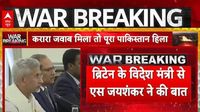As tensions escalate between India and Pakistan, diplomatic efforts have intensified, with Saudi Arabia and Iran taking the lead in mediating the situation. On May 8, 2025, Indian External Affairs Minister S. Jaishankar met with Saudi Arabia's Minister of State for Foreign Affairs, Adel Aljubeir, to discuss de-escalation strategies following India's military strikes on terror targets in Pakistan.
In a series of high-level diplomatic engagements, Iranian Foreign Minister Abbas Araghchi also arrived in New Delhi, emphasizing the importance of understanding the regional dynamics. The backdrop of these discussions includes the recent May 7 strikes by India, which were a direct response to escalating cross-border terrorism, particularly following the deadly Pahalgam attack on April 22 that claimed 26 lives, many of whom were civilians.
Jaishankar conveyed to Aljubeir and Araghchi that while India does not seek to escalate the situation, any further military aggression from Pakistan would be met with a "very very firm response." This statement underscores India's commitment to protecting its sovereignty amid rising tensions.
Meanwhile, U.S. Secretary of State Marco Rubio has been actively involved in the diplomatic dialogue, speaking with both Jaishankar and Pakistan's Prime Minister Shehbaz Sharif. Rubio emphasized the need for immediate de-escalation and reiterated U.S. support for direct dialogue between India and Pakistan. According to State Department spokesperson Tammy Bruce, Rubio expressed condolences for the civilian casualties resulting from the recent conflicts and encouraged both nations to improve communications.
In a tweet following his conversation with Rubio, Jaishankar highlighted India's measured response to cross-border terrorism, stating, "Underlined India’s targeted and measured response to cross-border terrorism. Will firmly counter any attempts at escalation." This sentiment reflects India's strategic approach as it navigates the delicate balance between defense and diplomacy.
The European Union has also weighed in, with High Representative for Foreign Affairs Kaja Kallas condemning the Pahalgam attack and calling for restraint from both sides. The EU's position stresses the importance of protecting civilian lives and engaging in constructive dialogue to resolve differences.
As the situation unfolds, the Pakistani military has reportedly attempted to retaliate by launching attacks on various military installations across northern and western India. Reports indicate that on May 8, Pakistan's military targeted multiple cities, including Jammu, Srinagar, and Pathankot, with missiles and drones. However, these attacks were largely thwarted by India's air defense systems, which successfully intercepted the threats.
In response to these provocations, India has maintained a state of heightened alert, implementing blackouts in several border regions as a precautionary measure. The Indian Army's readiness to counter any aggressive moves from Pakistan has been reinforced by the successful interception of at least eight missiles aimed at Jammu and Kashmir.
Amid these developments, the Indian government has reiterated its commitment to a "zero tolerance" policy towards terrorism. Jaishankar's discussions with British Foreign Minister David Lammy focused on the need for a unified front against terrorism, reinforcing the international community's stance on the issue.
Operation Sindoor, launched by India in response to the Pahalgam attack, has been described as a significant military operation that resulted in the destruction of nine terrorist hideouts and the elimination of over 90 terrorists. This operation, which occurred on May 7, was characterized by precision strikes targeting identified terrorist infrastructure.
Pakistan's Prime Minister Shehbaz Sharif has responded to the operation with strong rhetoric, vowing to hold India accountable for every drop of blood shed. His government has accused India of launching unprovoked attacks, further complicating the narrative surrounding the ongoing conflict.
The geopolitical implications of this conflict are profound, as both nations navigate their historical enmities while facing increasing international scrutiny. The role of regional powers like Saudi Arabia and Iran is critical, as their influence could potentially sway Pakistan's response and encourage a more diplomatic approach.
As India moves forward, the government remains committed to ensuring national security while also engaging in dialogue to prevent further escalation. The international community's involvement, particularly from the U.S. and EU, highlights the global stakes in this regional conflict.
In conclusion, the ongoing India-Pakistan tensions require careful management and diplomatic engagement to avoid further escalation. With Saudi Arabia and Iran stepping in as mediators, the hope remains that dialogue can pave the way for a more stable and peaceful resolution.


